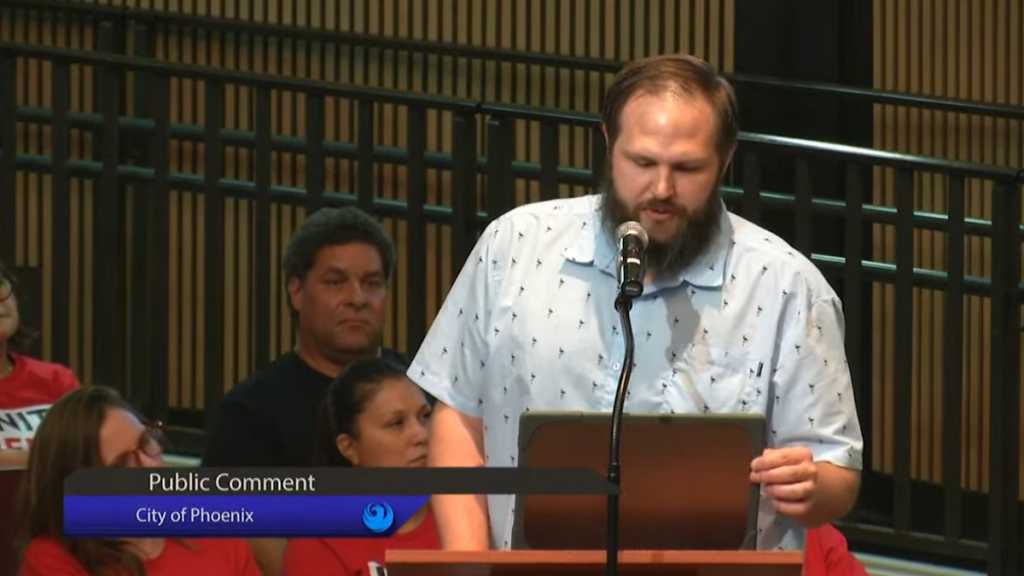On September 6, 2023, several concerned citizens participated in a Phoenix City Council meeting where they manifested their displeasure with Mayor Kate Gallego. Namely, they were angry about her support for policies that would allegedly lead to the prohibition of meat.
Jeff Caldwell of AZ Free News highlighted that several of the participants at this meeting brought attention to how Gallego is the Vice-Chair of C40 Cities. On the C40 Cities website, it notes that “C40 is a global network of mayors of the world’s leading cities that are united in action to confront the climate crisis.” C40 has a multitude of documents detailing the organization’s aim to lower and end meat consumption.
Gallego has an extensive track record of pushing for anti-meat policies. Back in March 4, 2020, Gallego signed off on the 2025 Phoenix Food Action Plan. This plan effectively establishes a new policy for the Office of Environmental Programs (OEP) at the City of Phoenix to enter in a contractual agreement with Arizona State University to set up “an AgriFood Tech Incubator in 2023 to accelerate ventures in sustainable food systems…”
So-called “sustainable food systems” are euphemistic descriptors for food systems that will feature little to no meat consumption. To achieve such a state, policy interventions will need to be implemented.
Gallego’s efforts are part of a broader agenda being pursued by political elites nationwide to re-engineer people’s eating habits under the pretext of “sustainability.” For example, Chicago is flirting with the idea of opening city-owned grocery stores.
Caldwell highlighted that the city has been taking steps to reduce meat consumption as much as possible. In 2021, Chicago started lowering red meat consumption at school, juvenile detention center, and Chicago Park District menus.
At the international level, global organizations such as the United Nations have pushed for reducing meat consumption in the name of maintaining environmental sustainability and promoting public health.
Groups such as the Farm Animal Investment Risk and Return (FAIRR), an investment initiative network that studies work conditions at factory farms, has called for meat taxation. This organization is no bottom-up, organic venture. FAIRR enjoys the support of investors that manage over roughly $4 trillion in assets.
In many respects, the polices pursued throughout the COVID-19 pandemic acted as a trial run for the Green New Deal — the radical economic reforms that public officials such as Rep. Alexandria Ocasio-Cortez have pursued to transition economies towards “green energy.” Lockdown policies caused massive disruptions in supply chains that impacted sectors ranging from energy to food production. In effect, many Americans were deprived of carnivorous options due to mass store closures and supply chain bottlenecks.
One of the key planks of the Green New Deal is the wholesale reduction of meat consumption. Per the Green New Deal’s FAQ sheet, one section called attention to the differences between reaching “100% clean and renewable” energy and “100% renewable” energy. Green New Deal proponents blame emissions from “farting cows” as the primarily culprit behind the failure to achieve a purely clean and renewable energy system.
The argument that livestock significantly contribute to global warming is dubious at best. According to US Environmental Protection Agency (EPA) figures, direct greenhouse gas emissions emanating from cattle and their manure constitute just 2% of US greenhouse gas emissions.
Virginia Tech and USDA-ARS have also challenged the assertion that livestock significantly contribute to global warming. They concluded that even if governments were able to successfully eliminate livestock from agriculture production such a move would only lower US greenhouse gas emissions by a mere 2.6%.
Contrary to popular belief, there is scant evidence that meat consumption poses a major threat to a person’s public health. In fact, there’s increasing evidence that meat eating has allowed humans to evolve into a highly-functional species that is capable of building advanced civilizations. Eliminating this staple of the human diet via legislation and allowing this to take root for multiple generations could create a much more impotent version of the modern man.
All told, global elites are not only trying to accumulate power for power’s sake by going after meat; they want to fundamentally alter society along technocratic lines. One way they will do so is by modifying people’s behavior through mass social engineering. The elimination of meat consumption — a constant throughout human history — is one of the principal ways that social engineers in the West will try to fundamentally restructure the average person.
Anti-meat technocrats are trying to play God here. However, political hubris is a harsh mistress. When politicians think they can totally restructure society in the image of their most deranged fantasies, the law of unintended consequences will inevitably rise and knock them down a few pegs. Sadly, when this process transpires, society will suffer irreparable amounts of damage.
All of this can be avoided if people stand up to so-called experts and unapologetically re-assert their traditional values.
